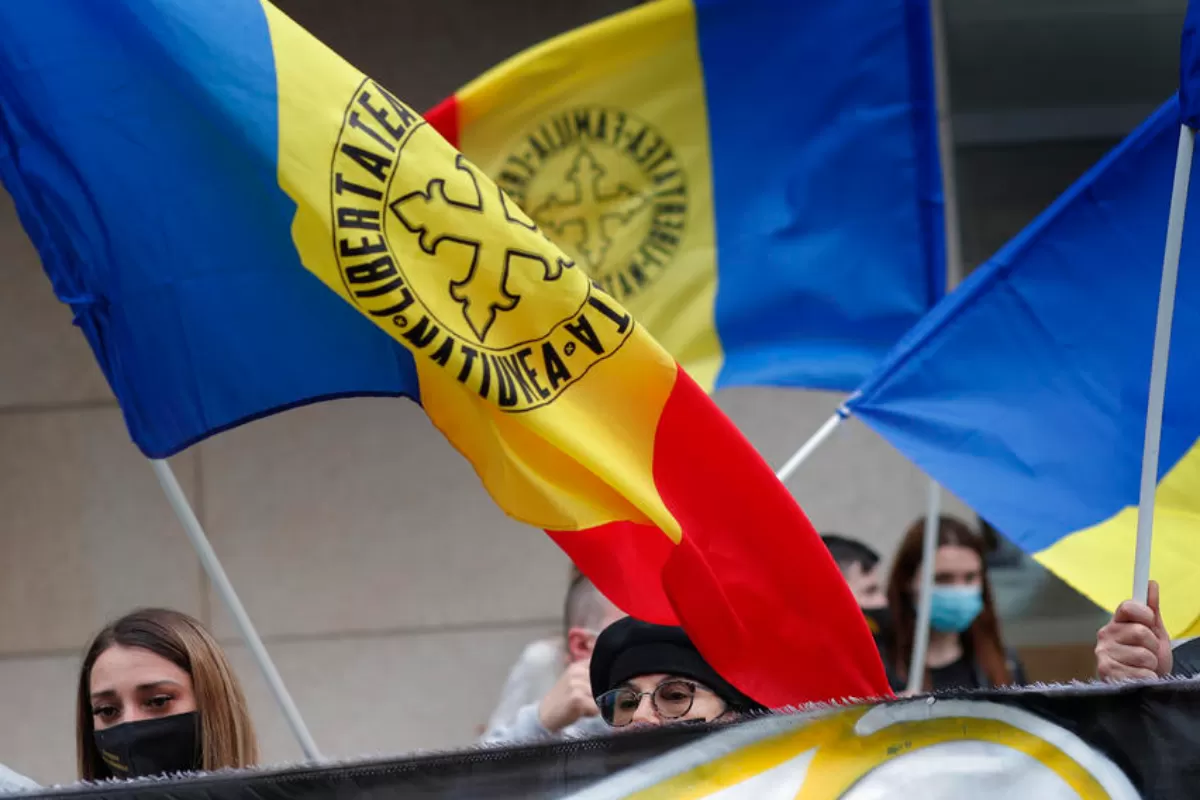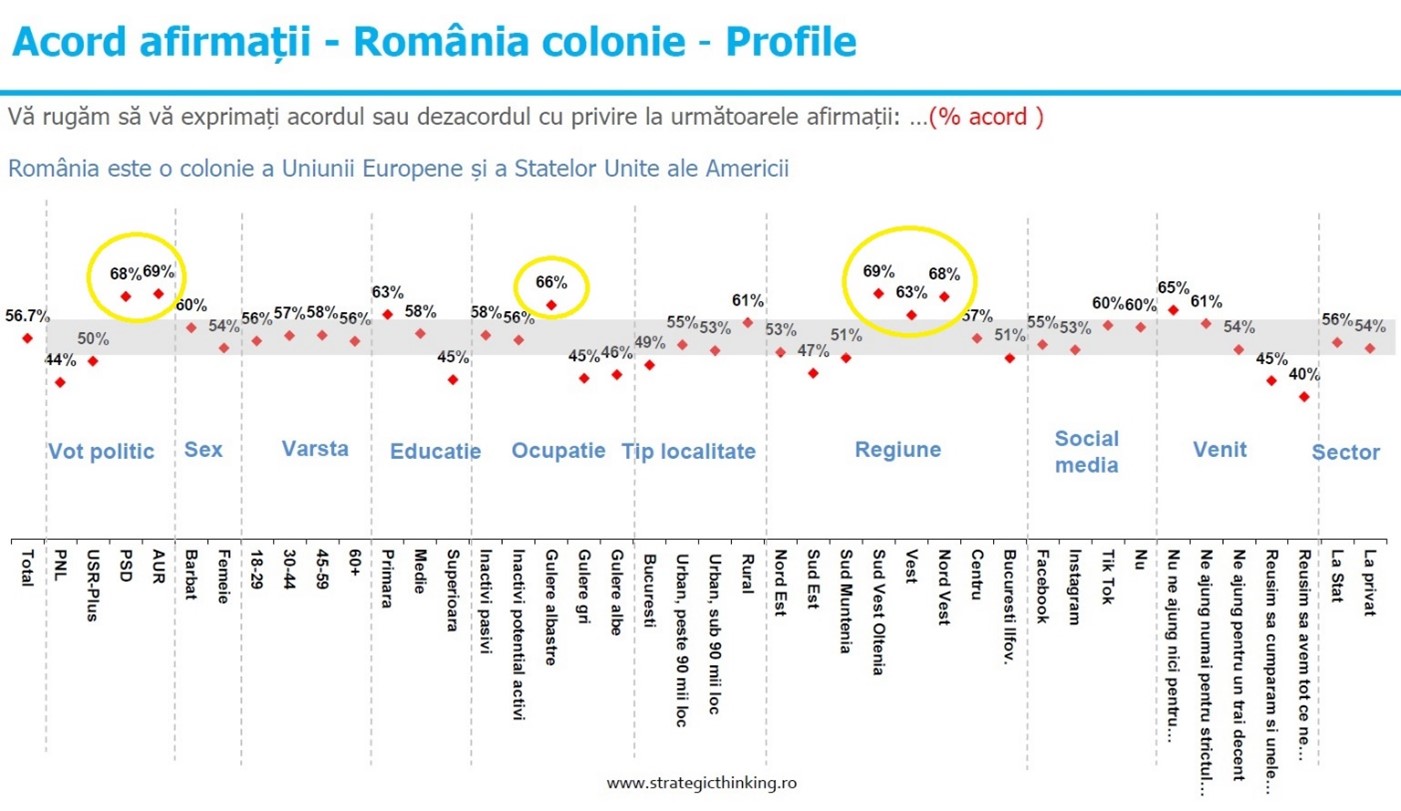
Mai rămâne România o redută anti-Rusia în regiune?
Alături de Polonia, România a fost dintotdeauna ţara cea mai ruso-sceptică din Europa de Est. La bine şi la rău, deoarece atunci când respingi visceral ceva ajungi inclusiv să nu-l mai cunoşti prea bine, filtrând informaţia despre el prin mituri şi clişee; în sensul ăsta românii sunt probabil şi est-europenii care ştiu cel mai puţin despre Rusia reală, având foarte puţine cârlige culturale în acea direcţie. Ce e sigur însă este faptul că atitudinea de rezervă faţă de marele vecin din Est e bine înrădăcinată în societate, încă dinainte ca el să ne târască în experimentul sovietic. În perioada interbelică România susţinea proiectul polonez Intermarium, imaginat de mareşalul Pilsudski ca un cordon sanitar la graniţa cu URSS, un fel de doctrină containment mult înainte să o formuleze George Kennan în celebra scrisoare, dar care n-a prea funcţionat pentru că s-a tot schimbat ca geometrie şi intenţii, polonezii nefiind nici ei o naţiune foarte consecventă cu planificarea. Astăzi există un succesor mult mai puţin războinic şi cu accente economice, Iniţiativa celor Trei Mări, în care exact la fel jucăm în echipă cu Polonia.
Anti-occidentalismul și influența indirectă a Kremlinului
Asta e aşezarea clasică a echipelor pe teren, aşa cum ţi-o recită orice român: noi şi polonezii pe poziţii ferme în apărare; vecinii noştri în diverse stadii de non-combat, adică angajament economic în sectoare strategice, uneori blaturi diplomatice şi în tot cazul empatie cultural-identitară, după cum a fost istoria fiecăruia. Atât doar că două sondaje de opinie recente, realizare unul în România şi altul în regiune, vin să clatine un pic certitudinea ruso-scepticismului românesc. Nici n-ar fi de mirare să apară schimbări din moment ce în ultimii douăzeci de ani am fost bombardaţi cu propagandă şi dezinformare dinspre Kremlin. Dar nu direct, pentru că asta nu ar putea funcţiona aşa de bine ca în Serbia, de exemplu, ci indirect, prin oferirea gratuită de fluxuri de conţinut media anti-occidental care să fie reciclat în limba română, precum şi prin cultivarea de lideri politici şi de opinie care pot transmite credibil poporului idei anti-UE, anti-NATO, anti-capitaliste (atâta vreme cât capitalismul în chestiune e occidental, nu rusesc, chinezesc sau al cleptocraţiei locale).
În general, e promovat orice beşteleşte sistemul democratic ca idee, statul de drept şi mobilizează perdanţii tranziţiei post-comuniste şi reformelor către eficienţă, fără ca neapărat să se menţioneze că impulsul şi resursele vin din Rusia. Cu cât actorii acestui joc sunt mai autentic-locali, cu atât mai bine, pentru că vocea lor sună mai natural. Nişele de anti-occidentalism reprezentate de fostele cadre militare şi din servicii epurate la intrarea în NATO sunt un important rezervor de cadre; la fel comunităţile conservator-religioase grupate în jurul unor duhovnici-guru ori, mai nou, “the angry young men”, fenomen bine analizat acum în Europa: grupuri de bărbaţi tineri cu educaţie precară şi frustrări profesionale, care au cam pierdut trenul tuturor tranziţiilor (globalizarea, cea post-comunistă la noi) şi care se strâng în jurul unor asociaţii sportive (arte marţiale de multe ori), cluburi paramilitare, găşti de bikers etc. E foarte util dacă atitudinile anti-occidentale vin bumerang chiar din Occident, exploatând nişele de sensibilitate rusofilă şi amplificatorii de mesaj de acolo: când România, ca ţară invitat de onoare, se prezenta la Salonul de Carte de la Paris în 2013 cu scriitorul reprezentativ Savatie Baştovoi, un bizar călugăr-antreprenor din Basarabia cu legături în Transnistria şi sub ascultarea canonică a Patriarhului de Moscova, asta e un bun exemplu pentru strategia bumerang.
Rezultatele manipulării
Sunt semne că strategia funcţionează; ori poate, cine ştie, au loc în România mutaţii fireşti prin succesiunea de generaţii care duc şi la schimbări profunde de atitudine. Un sondaj publicat luna aceasta de StrategicThinking, ca proiect al Black Sea Trust al GMF, a făcut titluri pentru că dădea alianţa radicală anti-sistem AUR pe locul trei la intenţia de vot, cap la cap cu USR-Plus. Ce e interesant însă în acest sondaj nu-i atât scorul ca atare ci profilul simpatizanţilor AUR, care se potriveşte cu ce spuneam mai sus: mai curând tineri (30-44), profesii manuale, mediu urban. Asta e formula de aur (sic) a frustrării sociale uşor de mobilizat, cum ne-o confirmă şi istoria.

De asemenea, în timp ce la întrebările directe românii votează în continuare cu Occidentul în general – şi cu UE şi NATO în particular, de unde se recunoaşte că ne vin multe avantaje concrete – sunt multe dimensiuni pe care sociologii le numesc proxy din care deducem că undeva în adâncuri fierbe totuşi o nemulţumire difuză, care nu ştim ce direcţii va lua în viitor. De exemplu, un procent uluitor de ridicat se simt trataţi în Europa ca cetăţeni de mâna a doua (78%), iar aici diferenţele sunt mici în funcţie de partid sau profesie: aceeaşi impresie o au şi muncitorii manuali, şi gulerele albe. Cei mai frustraţi sunt, din nou, cei între 30 şi 44 de ani.

Putem presupune că aceastea sunt atitudini care vin din experienţa directă a lucrului în diaspora, în ocupaţii mai mult sau mai puţin calificate, ori unele amplificate de participarea în bule de conversaţie în care se vehiculează asemenea convingeri; fără o cercetare mai de profunzime nu ştim care e cauza predominantă. Ce e însă clar este tendinţa destul de răspândită de a atribui “extern”, cum spun psihologii, responsabilitatea pentru ceva care merge prost. Şi mai imprecisă şi colorată emoţional este opinia că România e o colonie a UE şi SUA (57% de acord), cu vârfuri anticipabile în zona partidelor PSD şi AUR, cu aceiaşi muncitori manuali în prim plan dar, surprinzător, procente mari în Banat şi Transilvania. Din nouă, fără cercetări detaliate nu putem şti cum joacă această întrebare pe sensibilităţile regionale: este un fel al majorităţii româneşti de a simţi ameninţată de minorităţi? Este un efect al omniprezentei propagande anti-occidentale a FIDESZ în rândul minorităţii maghiare? Nu ştim, dar ar fi interesant să ştim.

La următoarea întrebare însă nu mai există ambiguităţi: proiecţia externă a vinei este clară iar cei care dau vina în primul rând pe companiile străine pentru poluare în România (56%) sunt din nou cei în vârstă de 30-44 ani, din urbanul mic (unde astfel de companii e mai puţin probabil să existe) şi cu stare materială rezonabilă. Fără să putem fi 100% siguri, aici sunt toate semnele de atitudine dezvoltată nu pe baza experienţei directe ci indirect, din schimburile de opinii şi campanii colorate (geo)politic.

În fine, un alt lucru important aici e terenul pe care pică manipularea, atunci când ea există: după cum o arată graficul de mai jos, cu cât eşti mai puţin educat, inactiv pe piaţa muncii sau muncitor manual, cu atât eşti mai convins că n-ai luat ţeapă cu fake news, că minciunile nu ajung la tine ori ştii să te fereşti de ele. Asta nu face decât să confirme ceea ce ştim din nenumărate alte studii făcute în Vest, în privinţa asta chiar nu suntem deloc unici.

„NATO provoacă Rusia”
Bun, dar cum se leagă toate astea de tema iniţială, anume opiniile românilor faţă de Rusia şi permeabilitatea la propaganda Kremlinului? Chestiunea este importantă mai ales în această perioadă când Vladimir Putin se pregăteşte să facă mare tărăboi aniversar pe 22 iunie, când se fac 80 de ani de la Operaţiunea Barbarossa, adică invadarea Uniunii Sovietice de Germania nazistă şi aliaţii săi (între care şi România). Chiar mai mult decât la uzualele ocazii anuale de 9 Mai, va urma un val de propagandă şi manipulare istorică prin omisiune, instrumentând “fascismul” (care în accepţiune URSS-Federaţia Rusă înseamnă orice adversar al Kremlinului, fascist sau nu) şi narativul celui de-al Doilea Război Mondial început în iunie 1941, nu mai devreme.
Fără îndoială că ambasadele Rusiei vor lansa un val de teme provocatoare, coordonat, bazate pe victimizare şi ideea că ruşii sunt salvatorii Occidentului, ca şi în 1945. Dacă lucrurile vor fi foarte stridente, ele vor produce mai curând contra-reacţii şi iritare în ţări ca România şi Polonia, ca de obicei. Însă dacă vor fi mai subtile, cum Rusia ştie să facă atunci când vrea, temele de frustrare socială revelate de sondajul de mai sus vor fi exploatate abil pentru a întări în societatea românească ideea suveranist-relativistă că bun, Rusia n-o fi ea prietena noastră, dar iată că nici Occidentul nu e cu nimic mai breaz. Întâmplător, asta este exact poziţia formaţiunii AUR, mai nou în discuţii cu ceilalţi suveranişti din UE.
Un alt sondaj recent al GlobSec, făcut pe nouă ţări est-europene între care şi România, susţine ideea de mai sus că pe termen lung avem nişte vulnerabilităţi. Cercetarea constată că statele se împart în trei categorii botezate drăguţ (1) cei care se culcă cu ursul; (2) cei care hrănesc ursul; (3) şi cei care sunt rezervaţi faţă de urs. După cum ne aşteptam, noi suntem în ultima categorie alături de Polonia, deşi avem o atitudine ceva mai moale decât ei. Dar ca şi în sondajul precedent lucrurile interesante sunt în detalii. De exemplu, la întrebarea cine provoacă pe cine, NATO pe Rusia sau Rusia pe NATO, opiniile românilor sunt surprinzător de echilibrate, 38-37%.
Cu alte cuvinte, cu 1% mai mulţi români consideră că alianţa militară din care facem şi noi parte e de vină pentru tensiunile în relaţia cu Rusia. În linie cu cele de mai sus, nu trebuie citit aici iubire pentru Moscova (pe un alt item favorabilitatea Rusiei este doar 6%, la fel ca în Polonia) ci mai curând efectul propagandei de relativism strategic de care spuneam, adică o atitudine de felul “lasă, băi, că nici americanii … etc”. La această întrebare maghiarii şi cehii ies mai pro-NATO decât noi. De asemenea românii apar în sondaj destul de relaxaţi faţă de potenţialul de agresiune al Rusiei în regiune, în urma polonezilor (normal) dar şi a maghiarilor, cehilor sau, surprinzător, muntenegrenilor. În fine, ca să revenim la tema dragă Kremlinului, adică Războiul al Doilea care a devenit o prezenţă permanentă în vieţile noastre şi o grilă de interpretare a politicii prezente, majoritatea esticilor sondaţi aderă la viziunea ortodoxă a Moscovei că ei au meritul principal pentru înfrângerea Gemaniei naziste, nu Occidentul; în privinţa asta românii sunt tot împărţiţi la mijloc, 39-40%. Cu alte cuvinte, dacă se pune serios pe treabă Kremlinul are suficient material în regiune cu care să lucreze anul ăsta.



